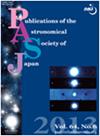AGN number fraction in galaxy groups and clusters at z < 1.4 from the Subaru Hyper Suprime-Cam survey
IF 2.2
4区 物理与天体物理
Q2 ASTRONOMY & ASTROPHYSICS
引用次数: 0
Abstract
Abstract One of the key questions on active galactic nuclei (AGN) in galaxy clusters is how AGN could affect the formation and evolution of member galaxies and galaxy clusters in the history of the Universe. To address this issue, we investigate the dependence of AGN number fraction (fAGN) on cluster redshift (zcl) and distance from the cluster center (R$/$R200). We focus on more than 27000 galaxy groups and clusters at 0.1 < zcl < 1.4 with more than 1 million member galaxies selected from the Subaru Hyper Suprime-Cam. By combining various AGN selection methods based on infrared (IR), radio, and X-ray data, we identify 2688 AGN. We find that (i) fAGN increases with zcl and (ii) fAGN decreases with R$/$R200. The main contributors to the rapid increase of fAGN towards high-z and cluster center are IR- and radio-selected AGN, respectively. These results indicate that the emergence of the AGN population depends on the environment and redshift, and galaxy groups and clusters at high z play an important role in AGN evolution. We also find that cluster–cluster mergers may not drive AGN activity in at least the cluster center, while we have tentative evidence that cluster–cluster mergers could enhance AGN activity in the outskirts of (particularly massive) galaxy clusters.z <星系群和星系团的AGN数分数;1.4来自Subaru Hyper prime- cam调查
星系团活动星系核(AGN)在宇宙历史中如何影响成员星系和星系团的形成和演化是研究活动星系核的关键问题之一。为了解决这个问题,我们研究了AGN数分数(fAGN)与簇红移(zcl)和到簇中心的距离(R$/$R200)的关系。我们关注的是超过27000个0.1 <的星系团和星团;zcl, lt;140多万个成员星系从斯巴鲁超级超级相机中选择。通过结合各种基于红外、无线电和x射线数据的AGN选择方法,我们确定了2688 AGN。我们发现(i) fAGN随zcl的增加而增加,(ii) fAGN随R$/$R200的增加而减小。导致AGN向高z和簇中心快速增加的主要因素分别是红外选择AGN和无线电选择AGN。这些结果表明,AGN群体的出现取决于环境和红移,高z星系群和星系团在AGN的演化中起着重要作用。我们还发现,至少在星团中心,星团-星团合并可能不会推动AGN的活动,而我们有初步证据表明,星团-星团合并可以增强(特别是大质量)星团外围的AGN活动。
本文章由计算机程序翻译,如有差异,请以英文原文为准。
求助全文
约1分钟内获得全文
求助全文
来源期刊

Publications of the Astronomical Society of Japan
地学天文-天文与天体物理
CiteScore
4.10
自引率
13.00%
发文量
98
审稿时长
4-8 weeks
期刊介绍:
Publications of the Astronomical Society of Japan (PASJ) publishes the results of original research in all aspects of astronomy, astrophysics, and fields closely related to them.
 求助内容:
求助内容: 应助结果提醒方式:
应助结果提醒方式:


